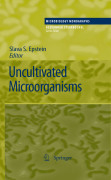
The estimate for the number of existing microbial species is 105 – 106, but only some thousands have been isolated in pure culture and described. The principal reason for this gigantic disparity is that, mysteriously, over 99% of allenvironmental microorganisms refuse to grow in the laboratory. The phenomenonof microbial uncultivability has been recognized as one of the main challenges for basic and applied microbiology and finding a way to access this uncultivated microbial majority may change many aspects of biology and biotechnology as we know them today. This volume presents the discovery of the phenomenon, the current hypotheses on its molecular nature, state-of-the-art approaches of outsmarting the uncultivated microorganisms and the principal applications of the new insights into medicine and biotechnology. Hopefully, it will be the keyto the hidden universe of uncultivated microorganisms, their unparallel diversity and enormous applied potential. INDICE: S S Epstein: The long history of a puzzling phenomenon; J Bunge: Statistical estimation of uncultivated microbial diversity; M LSogin, J A Huber: Unveiling microbial diversity through advances in DNA sequencing; T Gentry, Z He, J Zhou: Detecting and enumerating uncultivated microorganisms: functional DAN arrays; A Boetius: Measuring geochemical activities of uncultivated microorganisms; M Podar, M Keller, P Hugenholtz: Insights into novel biodiversity using single-cell genome amplification approaches; T Schmidt, A Konopka: Slow growing microbes: ecological strategies and consequences for cultivation; R Colwell: Viable but not cultivable microorganisms; S S Epstein: General model ofmicrobial uncultivability; V Miao, J Davies: Metagenomic approaches to drug discovery; K Lewis: Persisters, biofilms, and the problem of uncultivability; KH Nealson: Taking the concept to the limit: uncultivable bacteria and astrobiology.
- ISBN: 978-3-540-85464-7
- Editorial: Springer
- Encuadernacion: Cartoné
- Páginas: 310
- Fecha Publicación: 01/03/2009
- Nº Volúmenes: 1
- Idioma: Inglés
